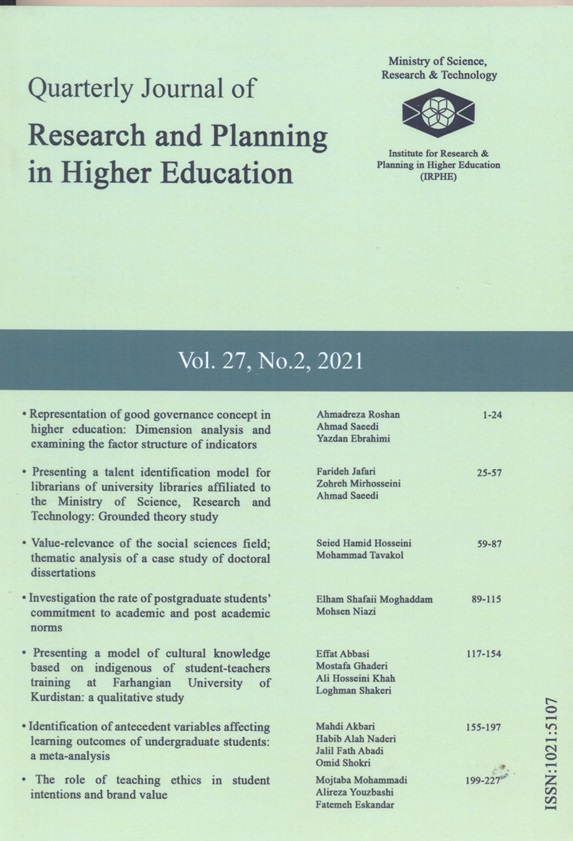Value-relevance of the social sciences field; thematic analysis of a case study of doctoral dissertations
Authors
1 Master student of Sociology, Faculty of Social Sciences, Tehran University, Tehran, Iran.
2 Professor, Faculty of Social Sciences, Tehran University, Tehran, Iran.
Abstract
In this study, an attempt was made to find a value-relevance relationship of the Iranian social sciences field and to formulate the concerns that effect researchers in this field. The main question was what the social sciences in Iran is thinking about and the question of which field is considered to be the main issue that can be pursued at the social level. In this regard, doctoral dissertations in this field during 2009-19 as one of the final products of this field were analyzed. The work began with a review of 437 dissertations by using "thematic analysis" method and by dividing them according to different fields of sociology, changes in the hegemony of areas were observed during these ten years. In some areas where there were a large number of dissertations at the beginning of the study period, including Sociology of Culture and Political Sociology, fewer dissertations were seen in recent years. While other popular fields, such as "Development Sociology" and "Economic Sociology", have continued to grow rapidly until the end of this period. In addition, areas in which fewer dissertations have been written throughout this period, including Sociology of Environment and Sociology of Education, have attracted significant interest from researchers in recent years. As a result of the second type of codification, a kind of "Economic-turn" is observed in the titles of dissertations during these ten years; this means that the economic issues of the society are becoming more and more important, and in the same way, addressing the issues of democracy, freedom and civil society has been marginalized.
Keywords
2. Bandura, A. (1982). Self-efficacy mechanism in human agency. American Psychologist, 37 (2), 122-147.
3. Banitalebi Dehkordi, B. (2016). Content analysis of thesis Master of Accounting in Iran. Journal of Accounting and Management Audit Knowledge, 5 (17), 1-11 [in Persian].
4. Barr, M.A. (1984). The selection of a dissertation topic: Elements influencing student choice. (Ph.D. Dissertation). The Ohio State University.
5. Bruun, H.H. (2007). Science, values, and politics in Max Weber’s methodology. United Kingdom: Ashgate Publishing Limited
6. Faghihi, F., Rakow, E.A., & Ethington, C.A. (1999, April). A study of factors related to dissertation progress among doctoral candidates: Focus on students' research self-efficacy as a result of their research training and experiences. presented at Annual Meeting of the American Educational Research Association (Montreal, Ontario, Canada, April 19-23)
7. Ghovati Sefid Sangi, A., & Shalchi, V. (2016). The problem of "issue in the social sciences of Tabataba'i" (case study: thesis of faculty of social sciences Tehran Allameh Tabataba'i). Journal of Iranian Social Science Studies, 13 (3), 118-132 [in Persian].
8. Khalaji, H., & Keshtidar, M. (2002). Quantitative review of physical education dissertations in higher education centers of the country from 1978 to 1999. Quarterly Journal of Research and Planning in Higher Education, 8 (1), 97-118 [in Persian].
9. Masoudi, S.E, & Zahed Zahedani, S.S. (2018). Analyzing Max Weber's objectivity with the use of Kant's transcendental philosophy. Journal of Iranian Sociological Association, 18 (4), 53-81 [in Persian].
10. Khandizaji, A.H. (2011). A critical study of sociology’s theses in Iran. Journal of Strategy for Culture, 4 (14-15), 115-140 [in Persian].
11. Maynard, B.R., Vaughn, M.G., & Sarteschi, C.M. (2014). The empirical status of social work dissertation research: characteristics, trends and implications for the field. British Journal of Social Work, 44, 267-289.
12. Mohammadi, E. (2014). Content analysis of social work postgraduate dissertations. Quarterly Journal of Social Work Research, 1 (1), 137-171 [in Persian].
13. Mohammadpour, A. (2018). Counter-method: The philosophical underpinnings and practical procedures of qualitative methodology. Tehran: Logos Publications [in Persian].
14. Niksirat, M., Badri, S.A., & Rezvani, M.R. (2012). Effective factors on the selection of scientific research topic of graduate students majoring rural geography and planning. Quarterly Journal of Research and Planning in Higher Education, 18 (3), 87-110 [in Persian].
15. Olalere, A.A., De lulio, E., Aldarbag, A.M., & Erdener, M.A. (2014). The dissertation topic selection of doctorial students using dynamic network analysis. International Journal of Doctoral Studies, 9, 85-107.
16. Shirzad, M. (2008). Sociological review of Ph.D dissertation (case study in University of Tehran, Allame Tabatabayi University, Tarbiyat Modarres University and Azad Islamic University), M.A. dissertation, University of Mazandaran faculty of humanities & social sciences [in Persian].
17. Smigel, E.O. (1954). Trends in occupational sociology in the United States: a survey of postwar research. American Sociology Review, 19 (4), 398-404.
18. Swedberg, R., & Agevall, O. (2016). The Max Weber dictionary key words and central concepts, second edition. California: Stanford University Press.
19. Tavakol, M. (2018). Sociology of science. Tehran: Jameeshenasan publications [in Persian].
20. Weber, M. (2015). Selected works, from Max Weber: Essays in sociology. translated by Ahmad Tadayon, Tehran: Hermes Publications [in Persian].
21. Weber, M. (2016). The methodology of the social sciences. translated by Hasan Chavoshian, Tehran: Markaz Publications [in Persian].
22. Zebardast, M.A. (2015). Research paradigm in studies related to the organization and management of the higher education system: An analysis of articles in the Quarterly Journal of Research and Planning in Higher Education. Journal of Iranian Higher Education, 7 (4), 61-106 [in Persian].
 Quarterly Journal of Research and Planning in Higher Education
Quarterly Journal of Research and Planning in Higher Education
